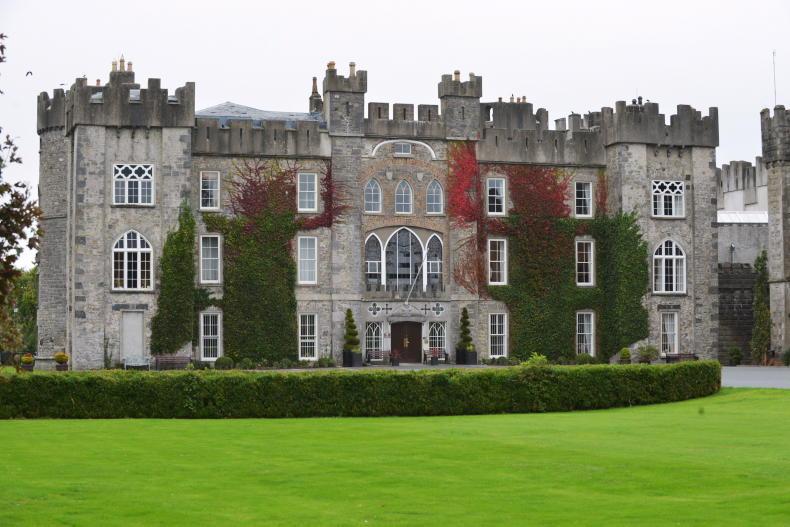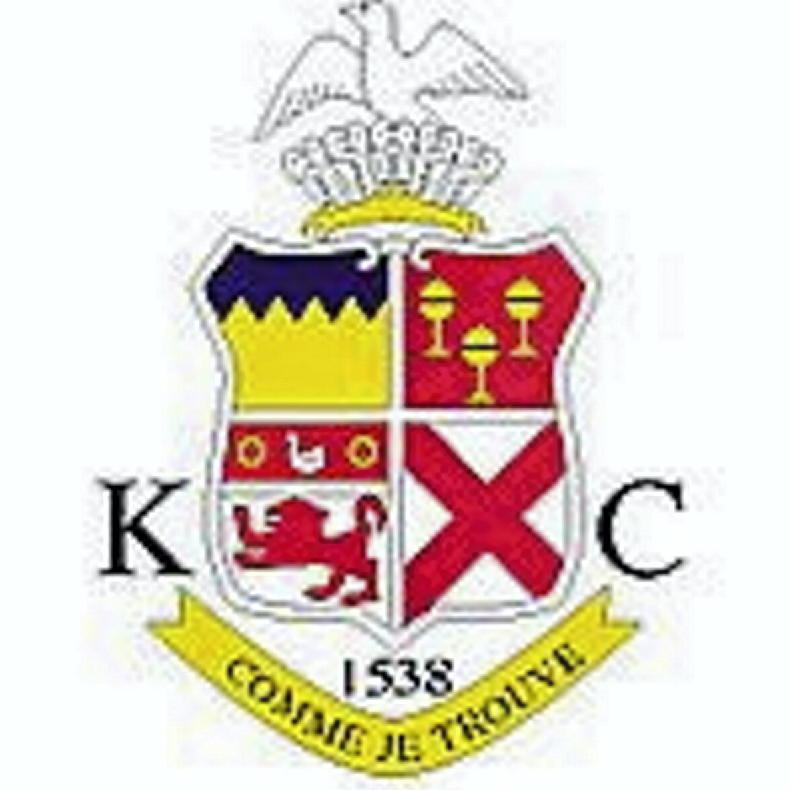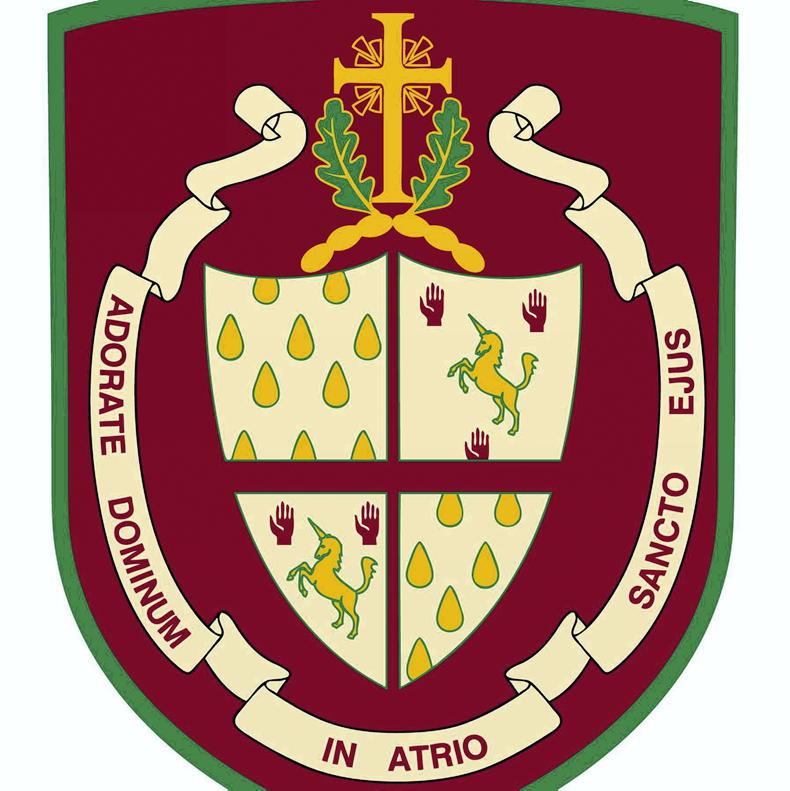
The grounds of Clongowes Wood College, Clane, Co. Kildare.
€20,290 per annum for seven-day male full board and school tuition fees.Clongowes Wood College, Co Kildare, is home to 450 boys. Headmaster Christopher Lumb strongly advocates the place and purpose of boarding schools in modern Ireland.
“A modern boarding school like Clongowes is a very outward facing place. Parents come here regularly to watch and support their sons playing rugby. For us it is very much about how we embrace family life.
“This notion of ‘parents sending their children away to boarding school’ is completely inaccurate – and addressing that is one of the biggest challenges boarding schools face,” he says.
Mr Lumb also pledges that – despite its substantial tuition and boar–ing fees – Clongowes has a balanced socio-economic student population, with about 10% of students enrolling through the bursary policy.
“Students are not chosen on ability, but on need – many come from Deis schools and from social and economic disadvantage,” he explains.
And much like Kilkenny College and Presentation Secondary School Thurles, fees cover more than education at Clongowes, Mr Lumb explains.
The wellbeing of each student looked after by a 360-degree care team; made up of housemasters, a nurse, rector, school counsellor, chaplain, special education needs teacher, a full time psychotherapist and more.
Farming and ag science
Clongowes Wood is also home to a 350ac dairy enterprise, with a mix breed herd of 300 cows. Mr Lumb acknowledges the unique educational and career development opportunities the enterprise offers Clongowes’ students. Akin to this, leaving certificate results for agricultural science at Clongowes are consistently higher than the national average.
“Ag science was first introduced as an off time table option, taught in the evenings. In recent years, we have brought it onto the main timetable and it has proven very popular – with about one-third of our current fifth year students studying it for their leaving cert.
“I think that substantial number reflects on the fact that about 25% of our students are from rural and farming backgrounds,” Mr Lumb reveals.
And so, from its record of high academic achievement, huge offering of sports, arts, music, politics and more, as well as a promise of lifelong friendships and individual development, Mr Lumb is confident that there is still a place in 2021 for boarding school education. “I have been the headmaster of both day and boarding schools over the years. Both type of school have a great richness about them. But learning is not something that starts and finishes in the classroom, and boarding pupils learn through extra-curricular activities every evening. Boarding school is an educational niche – a fully immersive 24 hour supportive experience,” he says.
€8,900 per annum for five-day full board, meals and participation in all extracurricular activity.  Free scheme school meaning there are no tuition fees for pupils.Home away from home for 446 co-educational boarders.
Free scheme school meaning there are no tuition fees for pupils.Home away from home for 446 co-educational boarders.Brian Nicholson is a full-time sheep and tillage farmer in Johnstown, Co Kilkenny. Brian recalls his time as a full-time boarder at Kilkenny College (1991-1998).
“Kilkenny College was the closest [school] with a Church of Ireland ethos and that is why we went there. Still, we were a good half hour drive from it, which was a big journey in the 90s. So I was a full-time boarder.
“I would have been good at the rugby in school, but there were a good few girls and boys who didn’t get involved in sport but had other interests in music, or the library. There were lots of things going on after class. So we learned a lot inside and outside the classroom.
“I made great friends at school. I know if the car broke down anywhere in the country I could give someone a call and they would sort me out.
“But the big drawback of boarding school for me was when I came home to farm after my time at Kildalton College; there were very few people from this area who boarded at Kilkenny College and so I didn’t have great local connections. Had I went to secondary school here in Johnstown, I would have made local friendships throughout school. I didn’t play on the local hurling or football teams either, so I didn’t really know many neighbours my own age.
“I overcame this over the years by getting involved in farm discussion groups and my children’s activities. But I had to build a whole new network of friends in my 20s and 30s. We all know that farming can be solitary enough as it is, so I think coming from a far away boarding school, you really do miss out on making connections with local farming guys and girls.
“I would say back in the 1990s, the boarding fees were worth it, because the sport and extra-curricular was a huge benefit at that time. We are talking about possibly sending our daughter to Kilkenny College too, because it is a very good school, but we have ruled out the boarding, because the cost is just not justifiable – transport is no big deal anymore, plus children have such good social outlets nowadays.”
Presentation Secondary School, Thurles
The Presentation Secondary School is a non-fee paying school.  €7,000 per annum is for five-day full board, meals and participation in all extracurricular activity.Facilities for 100+ boarders.
€7,000 per annum is for five-day full board, meals and participation in all extracurricular activity.Facilities for 100+ boarders.Aoife Sutton is a 26-year-old full-time nurse and also farms with her father at home, just outside of Roscrea, north Tipperary. Aoife shares her experience of boarding at the all girls Presentation Secondary School in Thurles, Co Tipperary (2007-2013).
“My mam went to boarding school herself and that’s probably why my two sisters and I ended up going.
“We had to stick to a daily routine; The bell went off twice a week at 7.15am for mass in the Cathedral and for cleaning your living area. The other mornings we got to stay in bed until 7.30am. Breakfast was until 8am and then we studied until 8.45am. This was great, as it gave us the chance to look over notes for any tests that day. Then we walked from the dormitory to school. We were always supervised.
“At 1pm we had dinner, which was usually two or three courses. Then we went back to school again, until extracurricular activities started at 4pm. We had a brilliant gym and sport facilities, with the option of playing basketball, football, hockey, camogie, tennis and more.
“Study ran from 5-6pm. And then we had our tea and got to watch TV in the common room, before study started again from 7-9pm.
“Mobile phones were placed in a basket before study. After study we had an hour to use them and hang out with the other girls, until our phones were collected again for lights out.
“That was Monday to Thursday. We could go home on Friday evening until Sunday.
“We were really strongly encouraged in first year to take up a sport or activity outside the classroom. About 99% of us did speech and drama and I also did Irish and English debating.
“It was extremely structured and regimental – if you missed your 30-minute shower slot for instance – that was your own problem. And we had to learn to look after ourselves; doing our own laundry and changing our own bed sheets. It set us up for real life.
“If I have children, I would definitely consider sending them to boarding school. People think of those films years ago where boarding schools were really dark and dreary, but it is not like that anymore. It is disciplinary yes, but isn’t that just school?”
In the Republic of Ireland today, there are about 3,500 students in boarding school education. Approximately 2,000 of those are boys.
Note: Fee policies and installment structures vary for each school.
Read more
The gender gap in STEM careers
A career in science, the agri-industry – or both?
Teagasc dairy farm management course open for applications

The grounds of Clongowes Wood College, Clane, Co. Kildare.
€20,290 per annum for seven-day male full board and school tuition fees.Clongowes Wood College, Co Kildare, is home to 450 boys. Headmaster Christopher Lumb strongly advocates the place and purpose of boarding schools in modern Ireland.
“A modern boarding school like Clongowes is a very outward facing place. Parents come here regularly to watch and support their sons playing rugby. For us it is very much about how we embrace family life.
“This notion of ‘parents sending their children away to boarding school’ is completely inaccurate – and addressing that is one of the biggest challenges boarding schools face,” he says.
Mr Lumb also pledges that – despite its substantial tuition and boar–ing fees – Clongowes has a balanced socio-economic student population, with about 10% of students enrolling through the bursary policy.
“Students are not chosen on ability, but on need – many come from Deis schools and from social and economic disadvantage,” he explains.
And much like Kilkenny College and Presentation Secondary School Thurles, fees cover more than education at Clongowes, Mr Lumb explains.
The wellbeing of each student looked after by a 360-degree care team; made up of housemasters, a nurse, rector, school counsellor, chaplain, special education needs teacher, a full time psychotherapist and more.
Farming and ag science
Clongowes Wood is also home to a 350ac dairy enterprise, with a mix breed herd of 300 cows. Mr Lumb acknowledges the unique educational and career development opportunities the enterprise offers Clongowes’ students. Akin to this, leaving certificate results for agricultural science at Clongowes are consistently higher than the national average.
“Ag science was first introduced as an off time table option, taught in the evenings. In recent years, we have brought it onto the main timetable and it has proven very popular – with about one-third of our current fifth year students studying it for their leaving cert.
“I think that substantial number reflects on the fact that about 25% of our students are from rural and farming backgrounds,” Mr Lumb reveals.
And so, from its record of high academic achievement, huge offering of sports, arts, music, politics and more, as well as a promise of lifelong friendships and individual development, Mr Lumb is confident that there is still a place in 2021 for boarding school education. “I have been the headmaster of both day and boarding schools over the years. Both type of school have a great richness about them. But learning is not something that starts and finishes in the classroom, and boarding pupils learn through extra-curricular activities every evening. Boarding school is an educational niche – a fully immersive 24 hour supportive experience,” he says.
€8,900 per annum for five-day full board, meals and participation in all extracurricular activity.  Free scheme school meaning there are no tuition fees for pupils.Home away from home for 446 co-educational boarders.
Free scheme school meaning there are no tuition fees for pupils.Home away from home for 446 co-educational boarders.Brian Nicholson is a full-time sheep and tillage farmer in Johnstown, Co Kilkenny. Brian recalls his time as a full-time boarder at Kilkenny College (1991-1998).
“Kilkenny College was the closest [school] with a Church of Ireland ethos and that is why we went there. Still, we were a good half hour drive from it, which was a big journey in the 90s. So I was a full-time boarder.
“I would have been good at the rugby in school, but there were a good few girls and boys who didn’t get involved in sport but had other interests in music, or the library. There were lots of things going on after class. So we learned a lot inside and outside the classroom.
“I made great friends at school. I know if the car broke down anywhere in the country I could give someone a call and they would sort me out.
“But the big drawback of boarding school for me was when I came home to farm after my time at Kildalton College; there were very few people from this area who boarded at Kilkenny College and so I didn’t have great local connections. Had I went to secondary school here in Johnstown, I would have made local friendships throughout school. I didn’t play on the local hurling or football teams either, so I didn’t really know many neighbours my own age.
“I overcame this over the years by getting involved in farm discussion groups and my children’s activities. But I had to build a whole new network of friends in my 20s and 30s. We all know that farming can be solitary enough as it is, so I think coming from a far away boarding school, you really do miss out on making connections with local farming guys and girls.
“I would say back in the 1990s, the boarding fees were worth it, because the sport and extra-curricular was a huge benefit at that time. We are talking about possibly sending our daughter to Kilkenny College too, because it is a very good school, but we have ruled out the boarding, because the cost is just not justifiable – transport is no big deal anymore, plus children have such good social outlets nowadays.”
Presentation Secondary School, Thurles
The Presentation Secondary School is a non-fee paying school.  €7,000 per annum is for five-day full board, meals and participation in all extracurricular activity.Facilities for 100+ boarders.
€7,000 per annum is for five-day full board, meals and participation in all extracurricular activity.Facilities for 100+ boarders.Aoife Sutton is a 26-year-old full-time nurse and also farms with her father at home, just outside of Roscrea, north Tipperary. Aoife shares her experience of boarding at the all girls Presentation Secondary School in Thurles, Co Tipperary (2007-2013).
“My mam went to boarding school herself and that’s probably why my two sisters and I ended up going.
“We had to stick to a daily routine; The bell went off twice a week at 7.15am for mass in the Cathedral and for cleaning your living area. The other mornings we got to stay in bed until 7.30am. Breakfast was until 8am and then we studied until 8.45am. This was great, as it gave us the chance to look over notes for any tests that day. Then we walked from the dormitory to school. We were always supervised.
“At 1pm we had dinner, which was usually two or three courses. Then we went back to school again, until extracurricular activities started at 4pm. We had a brilliant gym and sport facilities, with the option of playing basketball, football, hockey, camogie, tennis and more.
“Study ran from 5-6pm. And then we had our tea and got to watch TV in the common room, before study started again from 7-9pm.
“Mobile phones were placed in a basket before study. After study we had an hour to use them and hang out with the other girls, until our phones were collected again for lights out.
“That was Monday to Thursday. We could go home on Friday evening until Sunday.
“We were really strongly encouraged in first year to take up a sport or activity outside the classroom. About 99% of us did speech and drama and I also did Irish and English debating.
“It was extremely structured and regimental – if you missed your 30-minute shower slot for instance – that was your own problem. And we had to learn to look after ourselves; doing our own laundry and changing our own bed sheets. It set us up for real life.
“If I have children, I would definitely consider sending them to boarding school. People think of those films years ago where boarding schools were really dark and dreary, but it is not like that anymore. It is disciplinary yes, but isn’t that just school?”
In the Republic of Ireland today, there are about 3,500 students in boarding school education. Approximately 2,000 of those are boys.
Note: Fee policies and installment structures vary for each school.
Read more
The gender gap in STEM careers
A career in science, the agri-industry – or both?
Teagasc dairy farm management course open for applications







SHARING OPTIONS